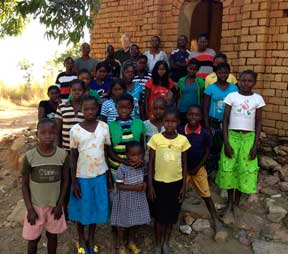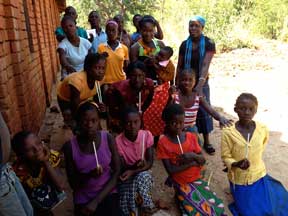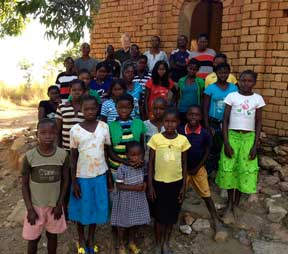 KINGSTON, RI – June 25, 2013 – Forget lazy beach days. He sleeps in a pup tent in the Mozambique bush, gets his water from boreholes and walks more than 40 miles a week. But who’s complaining?
KINGSTON, RI – June 25, 2013 – Forget lazy beach days. He sleeps in a pup tent in the Mozambique bush, gets his water from boreholes and walks more than 40 miles a week. But who’s complaining?
University of Rhode Island choral director Mark Conley can’t think of a better way to spend his summer, especially since it involves doing what he loves: teaching people how to sing.
Conley is on the other side of the world working with choirs in 16 villages throughout the Manda Wilderness Community Trust that will gather after three months to compete in a choral festival on July 27.
Phone and Internet access are spotty, so Conley is chronicling his journey through a spirited and beautifully written blog, http://intrepidconductor.weebly.com. The title conveys what he is: a fearless choir leader with boundless energy.
Mozambique, nearly twice the size of California, is located along Africa’s southeast coast. A former Portuguese colony with 1,500 miles of undeveloped Indian Ocean beachfront, the country is settling down after nearly two decades of civil war. Although the economy is growing, Mozambique is still one of the poorest countries in the world, with a population decimated by the war and HIV. A professor of music at URI who has conducted at Carnegie Hall, Conley is serving as the guest choir director for the Manda Wilderness Choral Festival, an annual event that showcases the region’s talent and is held in the village of Cobue, on the steps of an historic Catholic church, in the country’s northwestern corner.
A professor of music at URI who has conducted at Carnegie Hall, Conley is serving as the guest choir director for the Manda Wilderness Choral Festival, an annual event that showcases the region’s talent and is held in the village of Cobue, on the steps of an historic Catholic church, in the country’s northwestern corner.
To prepare for the journey, Conley, through his blog, says he studied ChiNyanja, or ChiChewa, the local language of the Manda Wilderness. He got in shape by walking in Rhode Island, a passion he was happy to pick up again after abandoning it for years: “I already owe Africa the gift of restoring my love of walking.”
His blog posts are witty and heartfelt.
After 24 hours of flying, one of his first stops is Lilongwe, a vibrant city in Malawi, which borders Mozambique. He immediately sets out on a long walk. He can barely contain his glee: “Words and pictures cannot convey how alive the whole scene was,” he writes. “The traffic, the honking, the shouts, the markets, the farm stands, the roosters crowing, minibuses packed to the gills with people. I loved the totally bewildering, foreign and absolutely vital scene passing before me.”
He quickly learns that men do not wear shorts – ever. Only boys wear shorts. Even young men are in trousers. Back at the lodge, he eats a $4.20 dinner of rice, beans, vegetables and peri peri sauce, a hot sauce of peppers and garlic. The meal, he reports, is “outstanding.” Other delicacies include quiche, fish steamed in grass, potatoes, carrots, green beans and citrus ice cream.
A few days later, he boards a small plane that flies across the “spectacular” Malawi countryside to another city, where he takes a boat to his home base at the Nkwichi Lodge on pristine Lake Niassa, but not before spotting a “few crocodiles sunning themselves on the rocks.” Vervet monkeys, skinks, geckos, bee-eater birds, huge African cockroaches and a giant flat spider that he coaxes out of his mosquito net are among his other sightings. Home is a one-room hut, with a roof porch held up by tree trunks.
He’s in heaven.
Over the weeks, he visits small villages – Utonga, Mataka, Chicaia – to teach people how to sing, focusing on breathing, posture, and pitch. His hikes are long, through tall grass that whips his face as he makes his way. The sun beats down. His water bottle is down to a few sips. He worries he might collapse from heat stroke and then passes women carrying 20-gallon buckets of water on their heads. “I made up my mind to shut up and do my best,” he says.
In his downtime, he selects two pieces to teach the choirs. The first is a canon he learned from a Burundian man to calm conflicts in refugee camps. The text is adapted from John 14:27: Let not your heart be troubled; I bring you my peace. The second piece is from the Caribbean – Balia di Sehu, by Eduard Toppenberg. Caribbean music, especially Reggae, is a favorite in Mozambique, which has a unique Afro-Iberian-Brazilian culture.
His rehearsals with the villagers are memorable and, in some cases, fun. He’s impressed with their talent and dedication. He uses his cell phone, charged by his solar backpack, to give them immediate audio and video feedback. It’s the first time many people have seen themselves on video. They are mesmerized.
“The competition aspect of the festival is very important,” he writes. “I am learning that villages take these honors seriously. People know which village won the choir festival, the canoe races, the netball games, and the soccer games for many years back.”
On his travels people communicate the old-fashioned way – in person: What did you do today? How’s your mother? Are the fish biting? “As we kept meeting people I felt I had entered a Dickensian novel,” he writes. “In so many 19th century stories, the characters meet other characters by chance at a dock or on a path and suddenly circumstances change as a stranger brings unexpected news. I always thought such events were a little far-fetched, but here a minor version of it was happening to us every 10 minutes or so! Life is indeed very different without 21st or even 20th century means of communication.”
Conley gets a tour of a community farm, a treat since he tills the soil back home in North Kingstown. “Students are working hard to learn the names of many herbs, vegetables and fruits that are foreign to them: lettuce, arugula, peppers and even passion fruit,” he writes. “One older boy in particular is interested in everything on the farm. He has no paper of his own and is writing everything down with a broken ballpoint pen on his left arm.” After the tour, the staff brings out big buckets of tea, steaming hot but irresistible.
In one village he watches a woman make a floor mat for sleeping by “weaving a long thin strand of palm leaves, about five or six inches wide and many feet long.” Her husband, the village chief, sits under a fig tree mending his fishing net. After lunch, Conley reluctantly eats a banana: “These bananas are very different from the ones at home! They are a quarter the size, and they have a drier, meatier texture, not that slimy texture I can’t stand. I end up eating two, which is probably a banana record for me.” He takes his tea without sugar, a puzzle to villagers, who like their beverage sweet.
Back at the lodge, he indulges with a shower. He washes his clothes in the freshwater lake, crystal clear and teeming with fish. “I put the clothes on rocks to dry before the sun is too low in the sky,” he writes. “Then I hang everything on a bamboo rafter in my hut to finish drying.”
Tomorrow, he will visit another village and then another. In one trek, he is alone on an “African path” for the first time. He is calm, at peace. He eventually greets a villager, who clasps his hands as they talk.
“Men only hold hands with one another in public while conversing,” he writes. “I have been told this comes from a time when tribal conflicts were quite common. Hands that were clasped could not produce a weapon. Contact between men and women in public never happens, even between spouses. Women also do not touch one another in public.”
Villagers are impressed with his language skills: “Atithandiza,” he says in ChiNyanja. She is helping us.
It takes a village to transport Conley to another world. His project is funded in part by grants from the Andrew Lloyd Weber Foundation, the Career Enhancement Program of the URI Council for Research, the URI Center for the Humanities, the URI music department, the Richard Beaupre Arts and Sciences Hope and Heritage Fund, as well as Conley’s choral students in the University’s music department who raised money for the trip.
Conley is scheduled to return to URI in time for fall classes, eager to share what he’s learned abroad. Meanwhile, expect more blog posts about the “adventures of a choral conductor moving about in the world.”
“Speak softly,” he writes, “and carry a medium-sized baton.”
Pictured above:
Mark Conley, choral director at the University of Rhode Island, stands with the Mbueca Anglican Church choir in Mozambique. Conley, of North Kingstown, is in the African country for the summer to help village choirs prepare for an annual choral festival.
Members of the Utonga Anglican Church Choir in Mozambique, with Eduardo Lembalemba as choirmaster, show the pencils they received as presents from the University of Rhode Island’s music department.
Photo courtesy of Mark Conley.

